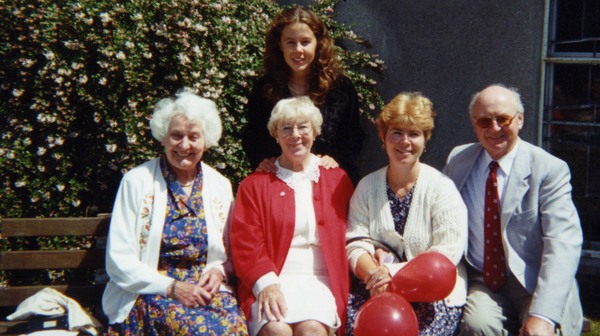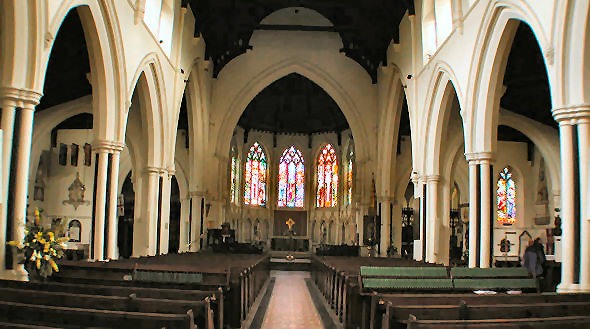It was quite by accident that Iris met the man who was to become her husband. As a junior sister she was on duty when Dennis, an architect taking his finals, visited the hospital with his boss, researching for a medical centre to be built in Abadan. They were married at St George’s in 1948 and three years later went to Canada where Dennis was involved with the top-secret early warning system around the North Pole. Being pregnant Iris returned home in advance of Dennis, crossing the Atlantic in horrendous gales and despite her fears for the baby, after ten days of severe seasickness, daughter Sue arrived safely and the proud father rejoined them when she was only three weeks old. Home then was a coachman’s cottage behind the post office but work was difficult to find and in 1957 a move to Waterlooville was made, with Sue and Paul, their son. Iris had joined the Mothers’ Union - St George’s was then a thriving branch of about fifty members - but she admits she was very ignorant. “It didn’t mean very much to me at all when I joined, but it’s ‘grown’ on me!” During the three years away she attended the local branch but it was not until the next move, to Singapore, that she became more deeply involved. That trip itself was quite an experience. Dennis flew out and his wife followed with two young children in tow. Their three week voyage took them through the Suez Canal, calling in at Bombay, a never-to-be-forgotten journey. The Singapore stay involved much hard work for Dennis and readjustment for them all, but Iris took to the life and climate “like a duck to water” and found the M.U. a perfect way of making new friends. The journey home was made as a family and greatly enjoyed.
On their return the Mulry’s lived in Rectory Road before moving to the family house in Whitmore Road in 1966. Dennis, by then working for the GLC, and Iris had always valued their holidays on the Norfolk Broads and Dennis was talking of buying a house for early retirement in that area and possibly commuting for a few months, when he was suddenly the victim of an unexpected and fatal heart attack at only fifty-four. Although she continues to enjoy regular holidays with son Paul on the Broads, Iris is everlastingly grateful that the plans had not been finalised when the catastrophe occurred. The support of her local friends, especially M.U. members, meant a great deal to her at the time when she admits she went to pieces and “dropped out of everything for two years”. The basic faith that brought her to St George’s in the first place saw her through that black despair and is, she affirms, “always part of me”.
There are four grand-children - Hannah and Emma are teenagers, Georgina is three and grandson Grainger is two. Emma is a server and little Georgina likes accompanying her grandmother to the Family Service although she is somewhat disappointed to discover that Christingle candles only come once a year! Paul, Iris records proudly, was given an electronics set one Christmas when he was eight and by Boxing Day had bugged the whole house! These days his job as a field engineer for Fax equipment involves him in a prodigious amount of travel but he still manages to find time to be Head Server at St George’s and to organise the rota.
Currently Presiding Member of Beckenham M.U. (She was Diocesan Overseas Chairman for six years, in which capacity she was happy to pay her way to go out to Malawi for their Centenary in 1987) Iris has many commitments within the church and within her family. She spares a little time for hobbies. “Purely for my own pleasure” is how she describes her piano playing and what will undoubtedly become a family heirloom is still under way in the shape of the embroidered cloth she started in Singapore! Reading is another pleasure, usually something devotional or spiritual, or a biography.
Iris’s enthusiasm, especially for the Mothers’ Union which means so much to her, is infectious. Beckenham may have changed, St George’s may have changed, but Iris’s indomitable faith has remained constant, despite events which could have conspired to crush it. It’s a faith she wants to share with those who are receptive but would never dream of forcing on anyone who is not. And that’s why she says simply: “When there’s not much you can say, you can be.”
Written by Jenny Froude, for the parish magazine of St George’s Church Beckenham, June 1993.
We believe many of our readers may be interested in this article which appeared in St George’s News in June 1993….but it’s not our St George’s News! It’s the St George’s News of St George’s Church, Beckenham, Kent! It’s a Parish Profile of Iris Mulry, who was Eric Dinneen’s sister, and who lived in Beckenham but also for a brief period in Waterlooville during the late 1950’s.
Beckenham is less than three miles from St George’s Waterlooville’s former Curate Fr Timon’s parish at Bellingham, which many of St George’s congregation will have visited.
Iris was five when her family took up residence in Beckenham in 1925. Coming from Peckham the move was described as “going to live in the country” and she remembers cows, buttercups and daisies in the fields near where Sainsbury’s stands today. It’s something of an understatement when she muses “Beckenham has changed a bit!”
The family “filtered into St George’s”. As a small child Iris found it very dark and mysterious but, although she didn’t understand all that went on, it appealed to her and somehow “just felt right”. High Mass she atended with a “sense of awe” and she was confirmed, a year after her mother, in white dress and veil, in 1933 after which the curate’s catechism classes for the candidates replaced the afternoon Sunday School in the vestry. In due course there was the Youth Club and the Coral League, which “whetted the appetite” for missionary work - her contribution at that time being the laborious knitting of at least one little vest each winter for the African babies!
School was initially Balgowan, followed by the County School for Girls (not Cator Park) which she left at the age of sixteen to go into an insurance office, which she hated! Her heart had been set on nursing but, looking back, despite the frustration she felt then she now sees evidence of a divine “plan” since the area she covered dealt with health insurance and sickness benefit.
During the war, however, the sight of the troops waving as they passed through Beckenham Junction on their way home from Dunkirk strengthened her resolve and she found an ally in Canon Boyd’s wife who had herself been a Westminster nurse. Despite parental displeasure Iris embarked on a career which she recognises “liberated” her and she trained throughout the war at the Westminster Hospital, coping with all the disruptions - evacuation, bombing, doodlebugs - and managed to take nursing by night and studying by day in her stride. She often worshipped at the nearby Guards’ Chapel and might well have been there the day it was bombed had she not succumbed to the lure of a walk in the park with her fellow nurses that Sunday morning. That decision still gives her a strange feeling …
But being in London had its compensations. Iris was able to celebrate with her fellow nurses by joining the crowds in front of Buckingham Palace on V.E.Day and also had the privilege of being on duty in Westminster Abbey for the Queen’s Wedding where, by climbing to the choir gallery, she managed a quick birds eye view.






